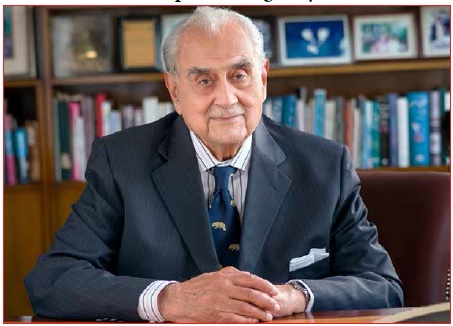A Pakistani Example of Longevity and Wellness
By C. Naseer Ahmad

“ Longevity has its place ,” said Dr Martin Luther King on April 3, 1968. One day later, at age 39, his life was cut short by an assassin’s bullet. But the vision he enunciated in “I have a dream” speech on August 28, 1963 is well on its way to fruition.
On November 3, 2020, the US elected its first Vice-President of African-American origin, twelve years after electing the first Black American president on November 4, 2008. More recently, President-Elect Biden has nominated Michael Regan as the first African American to lead the Environmental Protection Agency; the African American residents who suffered during the Flint, Michigan water crisis could feel a bit assured that there might be some environmental justice for them.
Longevity, however, is not a guarantee of success or happiness. Take for example the case of Edward Albert Christian George Andrew Patrick David, the full name of King Edward VIII of the United Kingdom, who lived twice as long as Dr King but died in exile in France, forty-two years after abdicating the throne. The viewers of “The Crown,” on Netflix will get a glimpse of his long-tortured life.

It is Pakistan’s good fortune to have an example of longevity and success. So, it is worth discussing a recent interaction with Syed Babar Ali. Being 95, Mr Ali has lived twenty-two years longer than Pakistan has been in existence. He is considered as an institution in Pakistan having created multiple businesses through partnerships with multinational corporations – Packages Limited, for example, founded the Lahore University of Management Sciences and launched philanthropic initiatives. Because Mr Ali is in touch with doctors and nurses while they are in training, he is in the know.
On December 7, 2020, this author moderated a Zoom conference on a case study in Pakistan. We selected Pakistan because of a US News article, July 28, 2016 mentioning this country “ where Prayers Promote Health . ” Furthermore, we invited Mr. Ali as the guest speaker because of his unique position in the country.
Wellness is an important topic because it is now not just the focus of a few excited individuals but also a part of a comprehensive outlook for human beings across the world. According to the World Health Organization , wellness is “a state of complete physical, mental, and social well-being, and not merely the absence of disease or infirmity.” Keep in mind, “ Good health and well-being ” is a United Nations (UN) Sustainable Development Goal (SDG) right after “ Zero Poverty ” and “ No Hunger .” In this regard, this author is not only a proponent of wellness but is also an active participant in a group of individuals - from different professional backgrounds such as arts, law, medicine and public service - who practice, study, and promote wellness .
The Zoom conference started when it was noon in Washington and 10pm in Lahore. Mr Ali began by saying that Lahore was a 2,000-year-old city and described how the population increased over time, especially since 1947. He was able to discuss a wide range of sub-topics related to wellness, keeping in mind that Pakistan is a developing country with both serious challenges as well as a lot of possibilities with a young population. He talked about the diet, the need to walk and thus avoiding a sedentary life. Giving his own example, being married for over sixty years to his cousin, Mr Ali talked about arranged marriages. “My wife and I used to ride bicycles, until the (vehicular) traffic made it difficult to do so,” he said.
Discussing his efforts for wellness, Mr Ali said that daily he walks about four kilometers (about two and half miles) around the garden in his house in Lahore. By his estimation, Mr Ali has walked thousands of kilometers during the months of isolation imposed by the coronavirus.
Stress is detrimental to wellness both in the developed as well as developing countries. So, we asked about how Mr Ali managed stress while managing large corporations, running a family farm and stewarding charities. His response was:
Stay away from what you do not like.
- Concentrate on what went well and immediately let go of what did not.
- Be with people that give you joy and pleasure as well as doing what gives you joy and pleasure.
Studies have shown that having a purpose in life is important for wellness and its subsequent impact on longevity. Faith goes hand in hand with having a purpose in life. People have to believe in something and their purpose in life will lead to something good. The discussion with Mr Ali affirmed the previous three sentences of this paragraph.
Believers also tend to study the scriptures for both guidance and to affirm their own faith – in good times and bad. So as the year 2020 is coming to a close and we yearn for hope and better days ahead, it might be helpful to not only to keep the faith but also put it into action for a good purpose. Therefore, the readers of the Holy Qur’an will find the following verse applicable to this discussion: “and Allah bestows His gifts on whomsoever He pleases without reckoning. ( Al-Baqarah- 2:213)” Mr Ali is one of the gifted human beings who have been blessed with rewards without measure and there is much to learn from his example of wellness.
-----------------------------------------------------------------------------
Back to Pakistanlink Homepage

